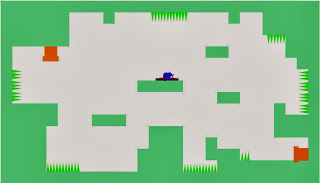In class on 2 Oct 2013, we played a few
different games with the purpose of assessing a game objectively
while trying to maintain the absorbed experience a player would.
One of the most interesting games was
one called QWOP, named after the keys used to play. In it, a player
uses the keys Q, W, O, and P to control the legs of an athletic
sprinter. Q and W control the knees while O and P control the hip
joints. The goal of the game is to see how far you can make the
character run using this control scheme. As you can probably imagine,
this is rather difficult. The game explores what it is like to make a
game out of something which we usually take for granted: how complex
the balancing act of running or walking is, which in video games is
usually as simple as pressing a directional key.
Another game I played during the
session was Canabalt. It was a platformer in which the player moves
rapidly from left to right, jumping from rooftop to rooftop, avoiding
obstacles in the way. I liked this game because it was simple and
fun.
We also played a few games together as
a class. One was called There’s Only One Level. This game was
rather interesting. You play as an elephant, and your goal is to get
to the exit of the level.
Sometimes you have to press a button
that’s up on a higher platform to open the door to the exit; other
times you must avoid pushing the button. At every completion of the
level, the player starts again, but with minor modifications to the
game mechanics. Another variation is that the arrow keys stop
working, and the player must discover that the only way to get to the
exit is by using their mouse to drag the elephant. I thought this
game was really interesting because it kept surprising me with which
game mechanic they would change to challenge the player to get to the
end.
Another game we played in class was
called Don’t Burn the Rope. It is a simple platformer in which the
player traverses a cave at first, in which there are directions as
the player progresses. It informs the player that they must burn the
rope to defeat the impending boss. At the end of the tunnel, the
player encounters the boss. The way to win is to climb up platforms
on the side to the roof and collects a torch, and then jump across
platforms to reach a chandelier which is hanging by a rope. If the
player jumps across the chandelier so that their torch touches the
chandelier, it drops on the boss and kills it. The player then wins
and is rewarded with a humorous song about the game during the
credits. This song was my favorite part of the game. It essentially
clues the player in that the game is somewhat of a joke and
encourages them to play again.
Finally, the last game we played in
class was called “dis4ia.” This game was rather different from
the rest of the games we had seen. It is an autobiographical video
game about someone’s experience going through hormone replacement
therapy. It was told in the form of a series of mini-games in which
the player makes their way through surreal interpretations of the
things the narrator had to do during her therapy. For instance, to
tell of her experience in the doctor’s office, the player must walk
through a lobby and find the chair to sit and wait. Later, to
communicate her experience taking hormone pillls, the player controls
a side-scrolling up-ended mouth which must collect pills which are
being shot down from a bottle above. It made for a pretty
entertaining and engaging story of the experiences the narrator had
to go through during her hormone replacement therapy.
They all made for rather entertaining
games. My personal favorite was There’s Only One Level, because
even though there was only one level, the variety of ways in which
the player had to get to the end made for a pretty fun experience.

No comments:
Post a Comment